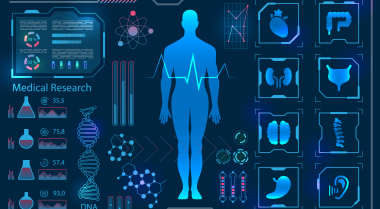Analysis of text written by doctors in medical notes of patients with COVID-19 (National Text Analytics project - ACE inhibitors)
14 April 2020 | Author: Dr Angus Roberts, Department of Biostats and Health Informatics
Analysis of text written by doctors is being used to find and extract patterns and hidden nuances within medical notes of those who have tested positive for COVID-19.
The notes that doctors type up into the electronic health record of a patient who has tested positive for COVID-19 are critically important. They may include language that describes symptoms and complications in great detail. Within these notes may lie nuances that could be vital to understanding the development of the disease, the way it was transmitted in the first place, and the most effective treatment with least side effects.
Richard Dobson, Angus Roberts and team are developing ways in which we can search the medical notes of all known COVID-19 patients rapidly, to glean information and insights that may help to understand more about this disease. They use a technique called Natural Language Processing. Developing these methods are part of a pre-existing national HDR UK project, called the National Text Analytics Resource. However, the team have switched their disease focus and are now applying the techniques they are developing to COVID-19.
A medicine for pre-existing conditions that exacerbates COVID-19?
Richard Dobson and the Precision Health Informatics Data Lab team, in partnership with James Teo (Clinical Director of Data Science, King’s College Hospital), have used this technique to investigate whether patients who take medicines known as ACE-inhibitors (taken for high blood pressure or diabetes), have an increased risk of severe COVID-19 disease due to the interaction of the virus with those medicines. Early data from China during this pandemic suggested that this might be the case. The virus that causes COVID-19 (called SARS-CoV-2) gets into the cells of our body through a structure on the surface of our cells called a ACE2 receptor. Taking ACE-inhibitors raises ACE2 levels, and so it was hypothesised that this may increase the risk of severe COVID-19 infection.
To explore this, the team was granted approval from London South East Research Ethics Committee to gain access for research to anonymised medical records of ~200 patients who had tested positive for COVID-19 at King’s College Hospital and Princess Royal University Hospital, London. Prior to being approved, the project was reviewed and shaped by patients on a virtual committee. They analysed the text written by doctors in these records (known as unstructured health data) using Natural Language Processing and combined this with analysis of coded health information (known as structured health data).
What they found
They found that people taking ACE inhibitors were no more likely to experience a severe form of COVID-19 than those who did not take them.
200 patients is thought to be a fairly small number for such a study, and the team are now adding to their numbers with patients from other Trusts UCLH and University Birmingham Hospital as well as additional patients from King’s College Hospital and Princess Royal University Hospital as inevitably increase. Nevertheless, this study suggests that patients on treatment with ACE-inhibitors should continue these medicines if they become unwell with COVID-19 illness.
Mental health impact of COVID-19
Angus Roberts and team are reusing some of the Natural Language Processing pipelines from this study at the South London and Maudsley NHS Foundation Trust (SLAM) – one of Europe’s largest mental health care services – to help identify those patients at increased risk of serious illness if they were to contract coronavirus. The project was again approved by a virtual oversight committee including patient representatives. The project is part of a larger piece of work at SLAM also including HDR UK Scotland researchers, that will enable the Trust to effectively manage patients most at risk, at a time when the Trust’s resources are stretched. The Trust also has projects looking at the effect of the pandemic on mental health, including factors such as anxiety, loneliness, isolation, and abuse (e.g. see Rob Stewart’s work).



